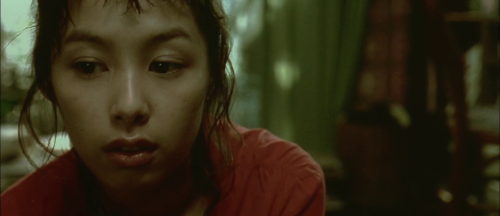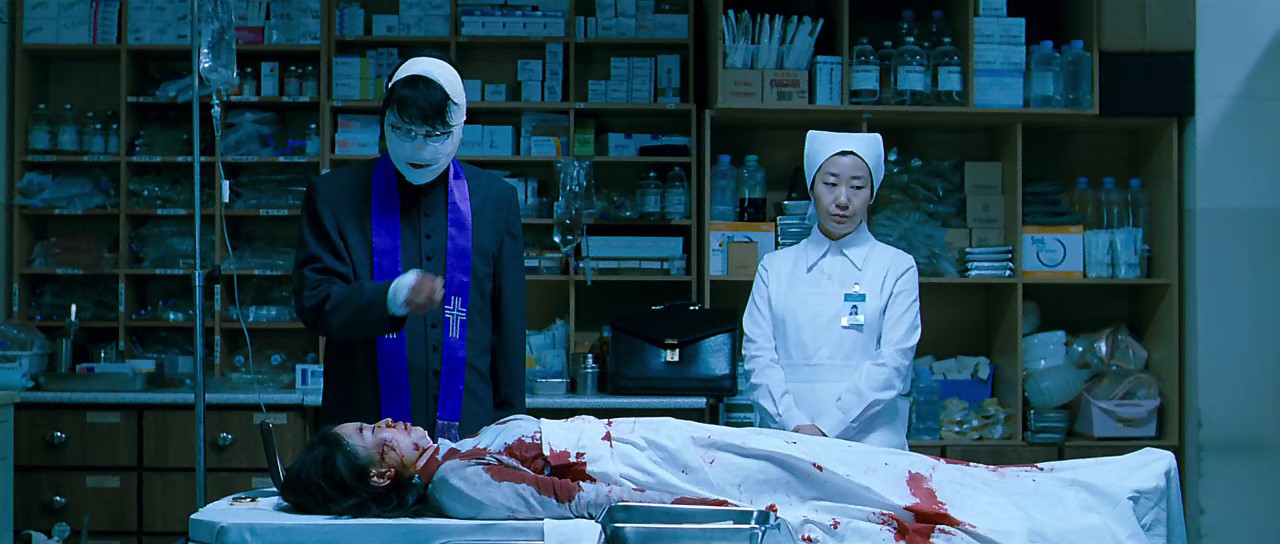Hey, remember Parasite? You know – the Korean dark comedy directed by Bong Joon Ho that won four Academy Awards? As well as being the only non-English film in history to win the Academy Award for Best Picture?

If you have watched Parasite, the film’s dark tone may have come as a bit of a surprise to some of you, considering we mostly know Korea for sickly sweet K-dramas such as Crash Landing on You (you can stop screaming now, fangirls), What’s Wrong With Secretary Kim, and Descendants of the Sun.

That’s not to say romantic K-dramas are inferior. While they do contain many repetitive, annoying tropes, K-dramas are so successful because they are effectively written and, more often than not, of extremely high production value.
What we’re saying is that Korean filmmakers have always been masters of creating gritty, and often darkly-comedic films. If you liked Parasite, and are interested in exploring the darker side of Korean cinema, here are some of our recommendations for you to check out:
1. Oldboy (2003)

You simply can’t talk about Korean cinematic greats without mentioning Oldboy. Directed by the legendary Korean director Park Chan Wook, Oldboy tells the tale of Oh Dae Su, a guy who seeks vengeance against a mysterious captor who not only killed his wife, but imprisoned him in a hotel room for 15 years.

That summary seems simple enough, but Oldboy’s plot makes more twists and turns than Christmas lights. What else is there to say about Oldboy? Oh, we don’t know – how about the legendary three-minute corridor fight scene where Dae Su beats up a whole bunch of dudes with a hammer in one take?
Also, if you thought Parasite was dark, well – Oldboy makes Parasite feel like Peppa Pig. Oldboy is an incredible hallmark of modern cinema, with raw, visceral performances, stunning cinematography, and a mindblowing story that is just balls-to-the-walls insane – but we do need to warn you that it really isn’t for the faint of heart.

It isn’t just the copious amount of graphic violence shown onscreen, but the fact that Oldboy tackles some very dark themes most studios wouldn’t touch with a ten-foot pole. Be rest assured: if you’ve got the guts to watch it, you’ll be rewarded with an experience one hardly finds in theatres anymore.
2. Burning (2018)

Did you like Parasite’s commentary on class division but thought it was too mainstream for you? Do you like slow-burn artistic films that make you feel smart?
Burning, in a similar manner to Parasite, shows off a side of South Korea we rarely see in glossy Korean dramas and K-pop music videos. However, while Parasite may have felt slightly less relatable if you didn’t live in absolute squalor like the Kim family – the financial situation of Burning’s two main protagonists may hit a little more close to home for most of us.

Burning tells the tale of Lee Jong-Su, an aspiring novelist who – incidentally – is never shown working on a single novel throughout the movie. Jong-Su lives in a farmhouse near the border of South and North Korea, and seems to work various odd jobs to make ends meet.
On one of his jobs, Jong-Su meets Hae-Mi, an former classmate of his who ‘used to be ugly’. She, too, is an odd-job drifter who lives in a cramped apartment. The two sleep together once, and Jong-Su is immediately smitten until Hae-Mi goes on a trip to Africa and meets the handsome, charming Ben. Ben drives a Porsche, and lives alone in a swanky apartment – living a life that Jong-Su and Hae-Mi could never hope to have.
The three of them start hanging out, and it’s clear that Hae-Mi’s really into Ben even though he clearly doesn’t feel the same way about her. Ben reveals this to Jong-Su after they spend a drunken night hanging out at Jong-Su’s sad little farmhouse in the weirdest, creepiest way: he tells Jong-Su he’s into burning abandoned greenhouses because he thinks they’re a waste of space, ‘just waiting to be burned down’. This, of course, pisses Jong-Su off, even though he can’t do anything about it…that is, until Hae-Mi goes missing.
Confused? Well, yes – it’s that kind of film. Unlike Parasite, there are no obvious bits that tell you outright that the film is about the divide between the rich and the poor, but you can feel it in the interactions between the characters – from Ben’s slimy condescension toward Jong-Su and Hae-Mi, casually showing them how carefree he is, to Jong-Su’s helplessness as he watches the girl he loves being waved around by Ben like a trophy. Burning is a very slow, very subtle movie that is kind of meant to be experienced rather than watched.

That’s not to say nothing exciting happens in it, of course. The film slowly burns its way to an explosive ending, but you’ll need a lot of patience and be in the right kind of mood to watch it. If you do have the patience, though, Burning will definitely leave its mark on you, and is a great example of Korean cinema’s stronghold over the Asian film industry.
3. Thirst (2009)

Leave it to Park Chan Wook to make a vampire flick that actually has bite. You won’t be seeing any sparkly prettyboys here – Thirst is the easiest film out of the five in our list to summarise: a Catholic priest turns into a vampire.
Yes, it’s exactly as fun as it sounds, at the start anyway. Sang-hyun, our hero (if you can call him that), is a goody-two-shoes Catholic priest who goes on a missionary trip in Africa, gets infected with a mysterious disease, and recovers from it only to find that it’s turned him into a vampire with an irresistible thirst for blood…which is kind of a problem if you’re supposed to be a priest and a pillar of the community.
Thirst takes great fun out of putting Sang-hyun into situations where he has to choose between keeping his vows to the Lord and his newfound thirst and power, and when shit naturally hits the fan, it all goes downhill from there. Unlike Oldboy, which we recommend you only watch with a strong stomach, Thirst is a Park Chan Wook film we can recommend to pretty much anyone. If you liked Parasite for how screwed up yet funny it was, definitely give Thirst a go.
4. The Man From Nowhere (2010)

Are you a fan of John Wick and Taken? Did you want to explore the ‘dark side of Korean cinema’ without becoming mentally scarred for life by Oldboy? Well, we may just have the film for you.
The Man From Nowhere has an incredibly simple plot – a quiet pawn shop owner befriends a spunky little girl who lives in his neighbourhood. One day, she gets kidnapped by a bunch of bad dudes, and he gets pissed. As it turns out, pawn shop dude was a former secret agent, and the kidnappers have just opened up a massive can of whoop-ass all over themselves.

However, there is much more to this movie than the simple pleasure of watching karmic violence. While the aforementioned John Wick seemed preoccupied with glorifying the violence unfolding on screen, The Man From Nowhere took a different, more sensitive approach that somehow makes the violence more visceral.

Overall, The Man From Nowhere is definitely the most fun watch in our entire list of dark Korean films here. It does go into quite a bit of detail about the illegal organ trafficking business, and is definitely not something you’d want to watch if you’re squeamish, but at least it’s got a more-or-less happy ending, which you’ll probably need after watching the next film on our list.
5. The Chaser (2008)

The Chaser is a film that will make you incredibly angry. If the wall nearest to your television screen doesn’t end up with a few fist-sized holes by the end of your viewing experience, you probably need to seek some kind of professional mental help.
The film tells the tale of Joong-Ho, a former detective-turned pimp who realises two of his girls have gone missing after they were sent to service the same customer, a man named Yeong-Min. Joong-Ho tries to set up a sting by having another one of his prostitutes, Mi-Jin, pay Yeong-Min a vist.

At this point, the audience learns that Yeong-Min is actually a deranged serial killer whose favourite hobby involves bludgeoning crying prostitutes to death with a hammer. He tries to do the same to poor Mi-Jin, but, in a stroke of bad luck, is caught by Joong-Ho, who beats him up and carts him off to the police. At the station, Yeong-Min even does everyone a favour by casually admitting to the cops that he’s committed nine murders. All’s well that ends well, right?

Nope. Things go wrong. Very, very wrong. We’re quite aware that the term ‘edge-of-your-seat’ is used all too often in reviews, but The Chaser is one of the few thrillers in existence where this term actually applies. You will not only be on the edge of your seat, but you’ll probably be pissing your pants, chewing your nails to bits, and screaming words so obscene they can never be published every thirty seconds or so. You wouldn’t believe that this movie was actually director Na Hong-Jin’s directorial debut because it is so tightly-paced and well-written, it just…oh, just watch it lah.

The best part? This movie was actually based on true events that actually happened in South Korea in the early 2000s. There is a reason why South Korean filmmakers are just so good at capturing the darkness of the human soul – they live in a country that’s been through some horrifying shit.
